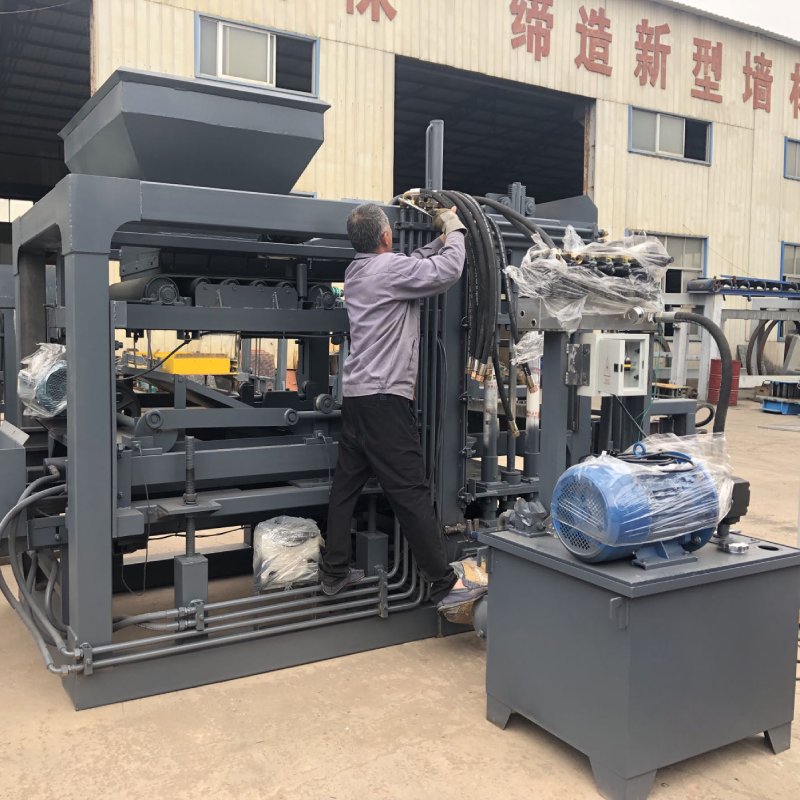
Image source Aiwei block machine
What is an Advanced Hydraulic Block Maker Machine
Introduction
In recent years, technological advancements have revolutionized the construction industry, bringing forth efficient and sustainable solutions for various building processes. One such innovation is the Advanced Hydraulic Block Maker Machine, which has transformed the way construction blocks are produced. This article delves into the mechanics, functionalities, and applications of these cutting-edge machines, showcasing their crucial role in modern construction practices.
- Understanding Hydraulic Block Maker Machines
1.1 Evolution of Block Maker Machines Block maker machines have a long history, with traditional methods involving manual labor and basic tools to mold and shape construction blocks. As construction needs evolved, so did the machines used to create these essential building components. Hydraulic block maker machines emerged as a game-changer due to their high efficiency and precision.
1.2 The Working Principle An advanced hydraulic block maker machine operates on the principle of hydraulic pressure. It uses hydraulic force to compress materials, such as concrete, fly ash, sand, cement, and aggregates, into durable and uniform blocks. The machine comprises a sturdy frame, a hydraulic system, a material storage unit, a mold or die, and an operator panel.
- Key Features and Components
2.1 Hydraulic System The heart of the advanced hydraulic block maker machine is its hydraulic system. It includes a hydraulic pump, cylinders, hoses, and valves. The hydraulic pump generates pressure, which is transmitted through the hoses to the cylinders. These cylinders are responsible for applying force to the material inside the mold, resulting in the compression and formation of blocks.
2.2 Material Storage Unit The machine is equipped with a material storage unit where raw materials are mixed in the right proportions. The mixture, prepared beforehand, is fed into the mold manually or automatically, depending on the machine’s capabilities.
2.3 Mold or Die The mold or die determines the shape and size of the blocks being produced. These molds can be interchangeable, allowing the machine to manufacture different types of blocks according to construction requirements.
2.4 Operator Panel To control and monitor the machine’s operation, an operator panel is integrated, offering a user-friendly interface. It enables the operator to adjust settings, control the hydraulic pressure, and diagnose any potential issues.
- Advantages of Advanced Hydraulic Block Maker Machines
3.1 High Production Capacity One of the primary benefits of advanced hydraulic block maker machines is their remarkable production capacity. They can produce a large number of blocks in a short period, significantly reducing construction time.
3.2 Consistent Quality These machines ensure consistent block quality, minimizing variations in size, shape, and density. Uniform blocks lead to stronger and more durable structures.
3.3 Cost-Effectiveness Though the initial investment might be higher, the long-term benefits outweigh the costs. With increased productivity and reduced labor requirements, these machines prove to be cost-effective over time.
3.4 Eco-Friendly Construction Hydraulic block maker machines promote eco-friendly construction practices. They efficiently use raw materials, and some models can even incorporate recycled materials, making them more sustainable.
- Applications of Hydraulic Block Maker Machines
4.1 Building Construction In the realm of building construction, hydraulic block maker machines are extensively used to produce bricks, hollow blocks, and solid blocks. These blocks serve as fundamental components for erecting walls, partitions, and other structural elements.
4.2 Road Construction For road construction projects, interlocking blocks are gaining popularity due to their strength and durability. Hydraulic block maker machines can produce these interlocking blocks with precision, creating robust and stable road surfaces.
4.3 Landscape Design In landscape design, decorative blocks and paving stones are used to create visually appealing pathways, driveways, and garden features. Hydraulic block maker machines can fabricate these intricate designs, adding an artistic touch to outdoor spaces.
4.4 Disaster Relief and Affordable Housing In disaster-prone regions and areas with housing shortages, hydraulic block maker machines have played a vital role in rapidly constructing affordable and resilient housing units.
- Safety and Maintenance Considerations
5.1 Operator Training Proper training of machine operators is crucial to ensure safe and efficient operation. Understanding the machine’s functionalities and safety protocols is essential in preventing accidents and maximizing productivity.
5.2 Regular Maintenance Scheduled maintenance is necessary to keep the machine in top condition and avoid breakdowns. Routine checks of hydraulic systems, molds, and other components help identify and address issues before they escalate.
Conclusion
Advanced hydraulic block maker machines have transformed the construction industry, revolutionizing the way construction blocks are produced. With their high efficiency, consistent quality, and eco-friendly nature, these machines have become indispensable in modern construction practices. Their applications span across building construction, road infrastructure, landscape design, and disaster relief, further highlighting their versatility and significance in today’s construction landscape. As technology continues to advance, these machines will undoubtedly evolve, driving the construction industry towards a more sustainable and efficient future.
